Evaluating AI, Talent Acquisition, Learning, and Change Management
VerifiedAdded on 2023/06/10
|8
|1917
|433
Report
AI Summary
This report examines the impact of artificial intelligence (AI) on the global business environment, highlighting its role in transforming business processes and decision-making. It discusses how AI enhances data analysis, predicts consumer behavior, automates tasks, and streamlines logistics, enabling organizations to make quicker and more accurate decisions. The report also evaluates the importance of talent acquisition, learning and development, and change management within a competitive global environment, emphasizing how AI can optimize these areas by improving recruitment, personalizing learning experiences, and accelerating change implementation. Ultimately, the report concludes that integrating AI into business functions is essential for streamlining processes, managing strategies, and fostering sustainable growth in the global landscape.

1
Paraphrase This Document
Need a fresh take? Get an instant paraphrase of this document with our AI Paraphraser
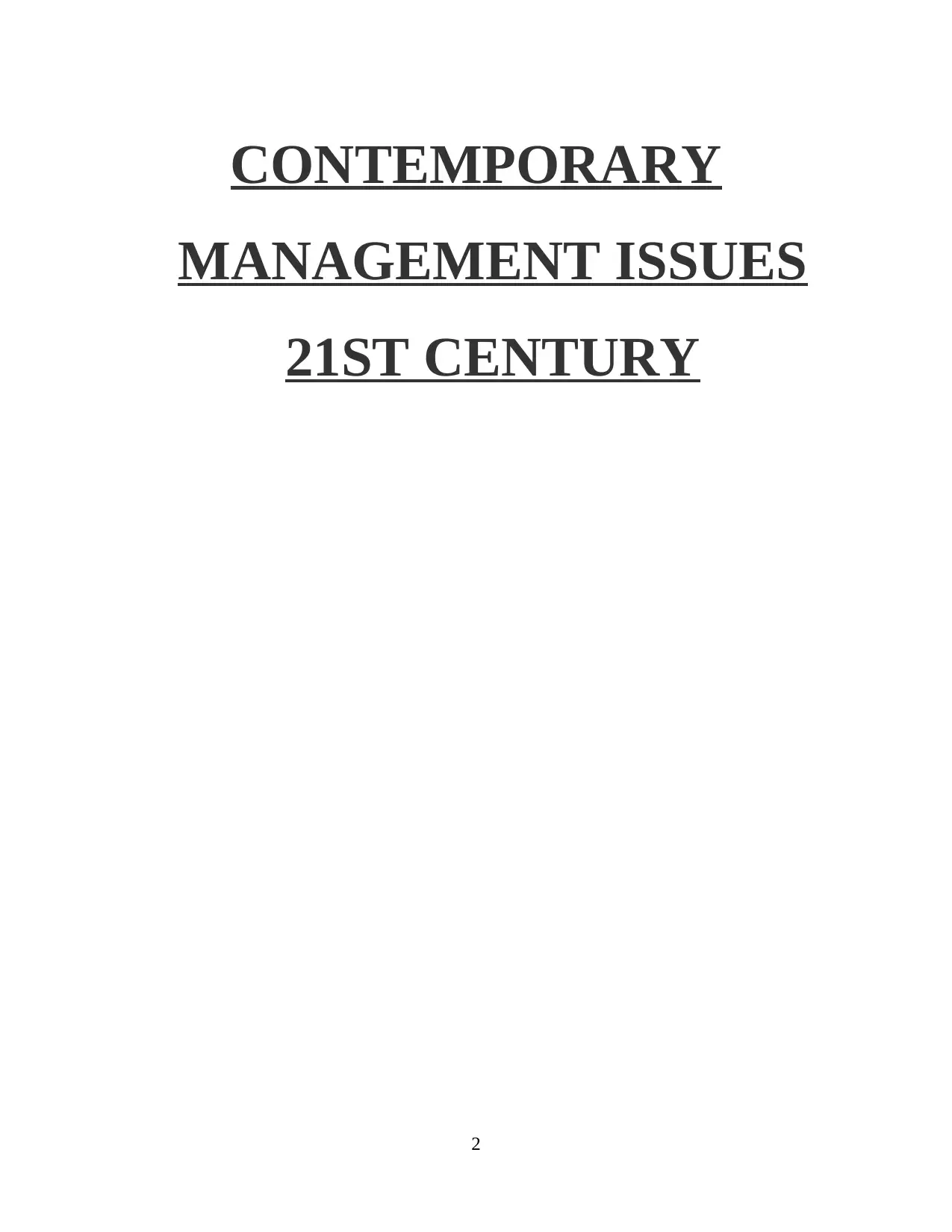
CONTEMPORARY
MANAGEMENT ISSUES
21ST CENTURY
2
MANAGEMENT ISSUES
21ST CENTURY
2
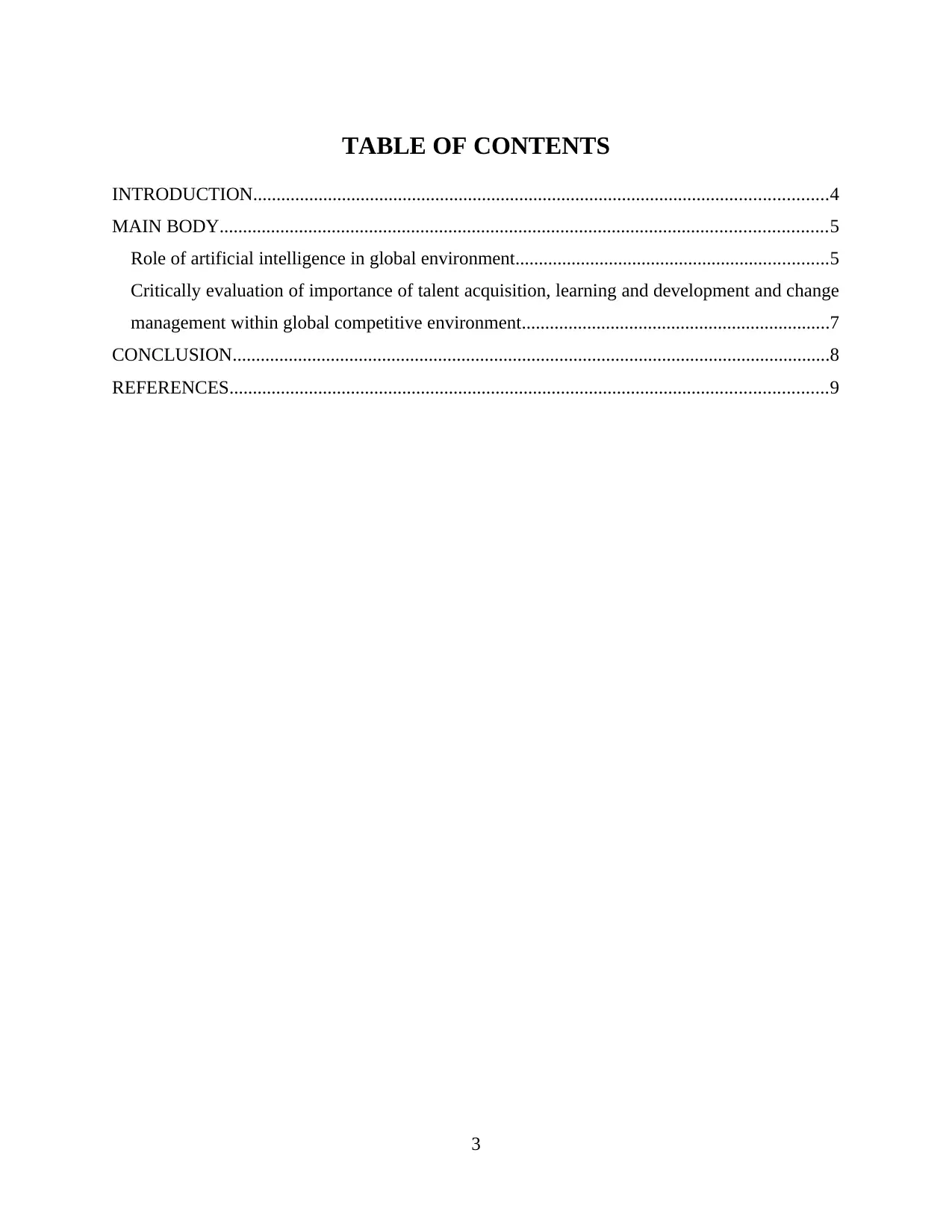
TABLE OF CONTENTS
INTRODUCTION...........................................................................................................................4
MAIN BODY..................................................................................................................................5
Role of artificial intelligence in global environment...................................................................5
Critically evaluation of importance of talent acquisition, learning and development and change
management within global competitive environment..................................................................7
CONCLUSION................................................................................................................................8
REFERENCES................................................................................................................................9
3
INTRODUCTION...........................................................................................................................4
MAIN BODY..................................................................................................................................5
Role of artificial intelligence in global environment...................................................................5
Critically evaluation of importance of talent acquisition, learning and development and change
management within global competitive environment..................................................................7
CONCLUSION................................................................................................................................8
REFERENCES................................................................................................................................9
3
⊘ This is a preview!⊘
Do you want full access?
Subscribe today to unlock all pages.

Trusted by 1+ million students worldwide
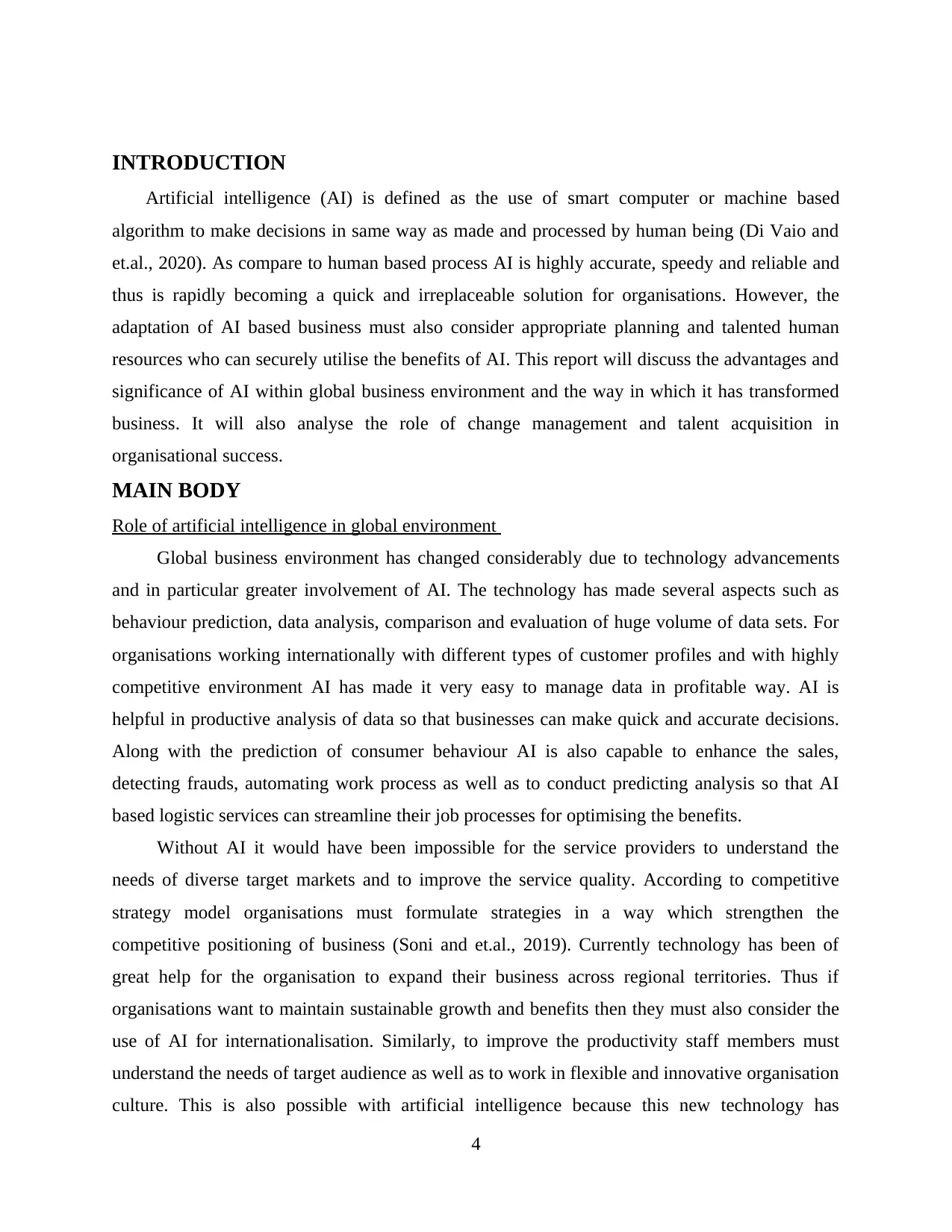
INTRODUCTION
Artificial intelligence (AI) is defined as the use of smart computer or machine based
algorithm to make decisions in same way as made and processed by human being (Di Vaio and
et.al., 2020). As compare to human based process AI is highly accurate, speedy and reliable and
thus is rapidly becoming a quick and irreplaceable solution for organisations. However, the
adaptation of AI based business must also consider appropriate planning and talented human
resources who can securely utilise the benefits of AI. This report will discuss the advantages and
significance of AI within global business environment and the way in which it has transformed
business. It will also analyse the role of change management and talent acquisition in
organisational success.
MAIN BODY
Role of artificial intelligence in global environment
Global business environment has changed considerably due to technology advancements
and in particular greater involvement of AI. The technology has made several aspects such as
behaviour prediction, data analysis, comparison and evaluation of huge volume of data sets. For
organisations working internationally with different types of customer profiles and with highly
competitive environment AI has made it very easy to manage data in profitable way. AI is
helpful in productive analysis of data so that businesses can make quick and accurate decisions.
Along with the prediction of consumer behaviour AI is also capable to enhance the sales,
detecting frauds, automating work process as well as to conduct predicting analysis so that AI
based logistic services can streamline their job processes for optimising the benefits.
Without AI it would have been impossible for the service providers to understand the
needs of diverse target markets and to improve the service quality. According to competitive
strategy model organisations must formulate strategies in a way which strengthen the
competitive positioning of business (Soni and et.al., 2019). Currently technology has been of
great help for the organisation to expand their business across regional territories. Thus if
organisations want to maintain sustainable growth and benefits then they must also consider the
use of AI for internationalisation. Similarly, to improve the productivity staff members must
understand the needs of target audience as well as to work in flexible and innovative organisation
culture. This is also possible with artificial intelligence because this new technology has
4
Artificial intelligence (AI) is defined as the use of smart computer or machine based
algorithm to make decisions in same way as made and processed by human being (Di Vaio and
et.al., 2020). As compare to human based process AI is highly accurate, speedy and reliable and
thus is rapidly becoming a quick and irreplaceable solution for organisations. However, the
adaptation of AI based business must also consider appropriate planning and talented human
resources who can securely utilise the benefits of AI. This report will discuss the advantages and
significance of AI within global business environment and the way in which it has transformed
business. It will also analyse the role of change management and talent acquisition in
organisational success.
MAIN BODY
Role of artificial intelligence in global environment
Global business environment has changed considerably due to technology advancements
and in particular greater involvement of AI. The technology has made several aspects such as
behaviour prediction, data analysis, comparison and evaluation of huge volume of data sets. For
organisations working internationally with different types of customer profiles and with highly
competitive environment AI has made it very easy to manage data in profitable way. AI is
helpful in productive analysis of data so that businesses can make quick and accurate decisions.
Along with the prediction of consumer behaviour AI is also capable to enhance the sales,
detecting frauds, automating work process as well as to conduct predicting analysis so that AI
based logistic services can streamline their job processes for optimising the benefits.
Without AI it would have been impossible for the service providers to understand the
needs of diverse target markets and to improve the service quality. According to competitive
strategy model organisations must formulate strategies in a way which strengthen the
competitive positioning of business (Soni and et.al., 2019). Currently technology has been of
great help for the organisation to expand their business across regional territories. Thus if
organisations want to maintain sustainable growth and benefits then they must also consider the
use of AI for internationalisation. Similarly, to improve the productivity staff members must
understand the needs of target audience as well as to work in flexible and innovative organisation
culture. This is also possible with artificial intelligence because this new technology has
4
Paraphrase This Document
Need a fresh take? Get an instant paraphrase of this document with our AI Paraphraser
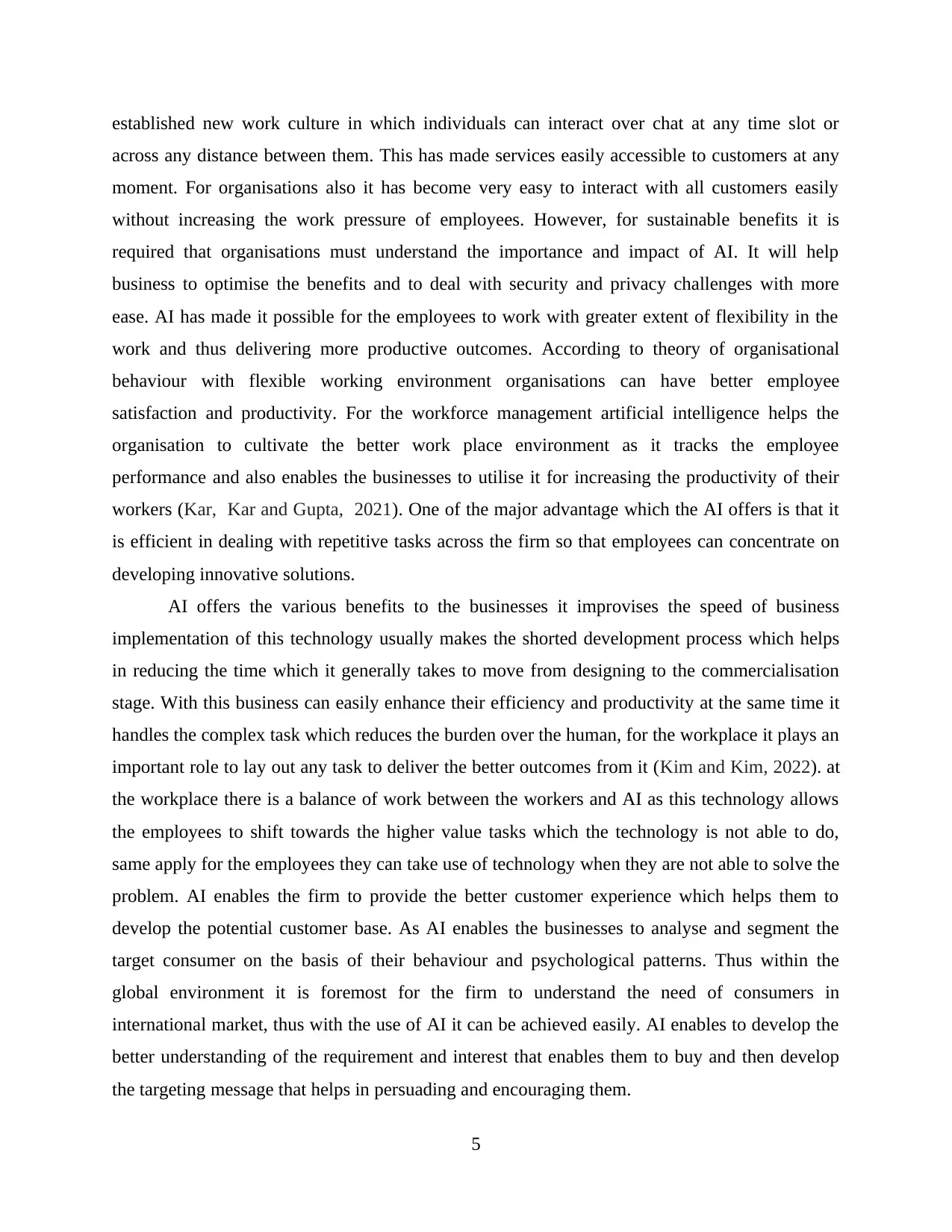
established new work culture in which individuals can interact over chat at any time slot or
across any distance between them. This has made services easily accessible to customers at any
moment. For organisations also it has become very easy to interact with all customers easily
without increasing the work pressure of employees. However, for sustainable benefits it is
required that organisations must understand the importance and impact of AI. It will help
business to optimise the benefits and to deal with security and privacy challenges with more
ease. AI has made it possible for the employees to work with greater extent of flexibility in the
work and thus delivering more productive outcomes. According to theory of organisational
behaviour with flexible working environment organisations can have better employee
satisfaction and productivity. For the workforce management artificial intelligence helps the
organisation to cultivate the better work place environment as it tracks the employee
performance and also enables the businesses to utilise it for increasing the productivity of their
workers (Kar, Kar and Gupta, 2021). One of the major advantage which the AI offers is that it
is efficient in dealing with repetitive tasks across the firm so that employees can concentrate on
developing innovative solutions.
AI offers the various benefits to the businesses it improvises the speed of business
implementation of this technology usually makes the shorted development process which helps
in reducing the time which it generally takes to move from designing to the commercialisation
stage. With this business can easily enhance their efficiency and productivity at the same time it
handles the complex task which reduces the burden over the human, for the workplace it plays an
important role to lay out any task to deliver the better outcomes from it (Kim and Kim, 2022). at
the workplace there is a balance of work between the workers and AI as this technology allows
the employees to shift towards the higher value tasks which the technology is not able to do,
same apply for the employees they can take use of technology when they are not able to solve the
problem. AI enables the firm to provide the better customer experience which helps them to
develop the potential customer base. As AI enables the businesses to analyse and segment the
target consumer on the basis of their behaviour and psychological patterns. Thus within the
global environment it is foremost for the firm to understand the need of consumers in
international market, thus with the use of AI it can be achieved easily. AI enables to develop the
better understanding of the requirement and interest that enables them to buy and then develop
the targeting message that helps in persuading and encouraging them.
5
across any distance between them. This has made services easily accessible to customers at any
moment. For organisations also it has become very easy to interact with all customers easily
without increasing the work pressure of employees. However, for sustainable benefits it is
required that organisations must understand the importance and impact of AI. It will help
business to optimise the benefits and to deal with security and privacy challenges with more
ease. AI has made it possible for the employees to work with greater extent of flexibility in the
work and thus delivering more productive outcomes. According to theory of organisational
behaviour with flexible working environment organisations can have better employee
satisfaction and productivity. For the workforce management artificial intelligence helps the
organisation to cultivate the better work place environment as it tracks the employee
performance and also enables the businesses to utilise it for increasing the productivity of their
workers (Kar, Kar and Gupta, 2021). One of the major advantage which the AI offers is that it
is efficient in dealing with repetitive tasks across the firm so that employees can concentrate on
developing innovative solutions.
AI offers the various benefits to the businesses it improvises the speed of business
implementation of this technology usually makes the shorted development process which helps
in reducing the time which it generally takes to move from designing to the commercialisation
stage. With this business can easily enhance their efficiency and productivity at the same time it
handles the complex task which reduces the burden over the human, for the workplace it plays an
important role to lay out any task to deliver the better outcomes from it (Kim and Kim, 2022). at
the workplace there is a balance of work between the workers and AI as this technology allows
the employees to shift towards the higher value tasks which the technology is not able to do,
same apply for the employees they can take use of technology when they are not able to solve the
problem. AI enables the firm to provide the better customer experience which helps them to
develop the potential customer base. As AI enables the businesses to analyse and segment the
target consumer on the basis of their behaviour and psychological patterns. Thus within the
global environment it is foremost for the firm to understand the need of consumers in
international market, thus with the use of AI it can be achieved easily. AI enables to develop the
better understanding of the requirement and interest that enables them to buy and then develop
the targeting message that helps in persuading and encouraging them.
5
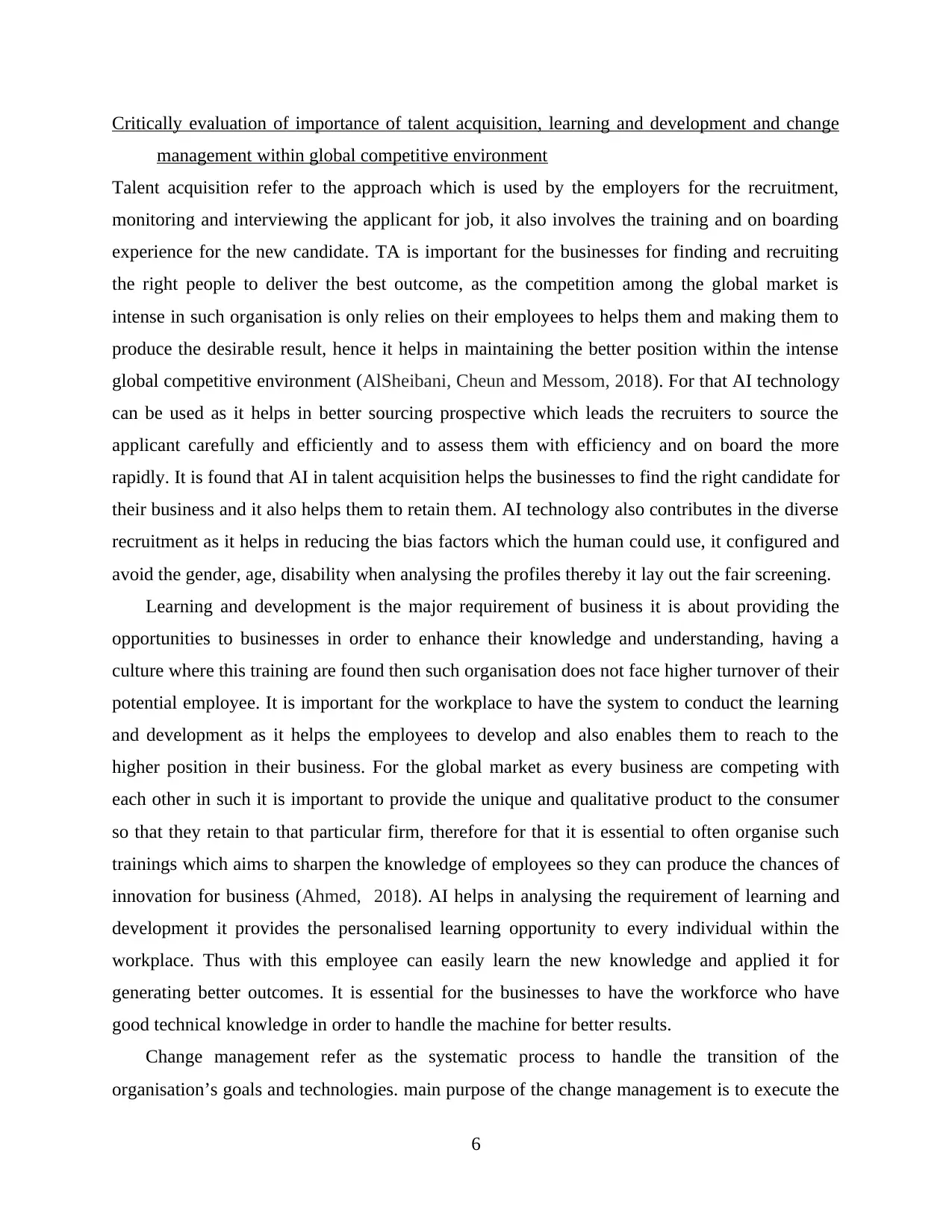
Critically evaluation of importance of talent acquisition, learning and development and change
management within global competitive environment
Talent acquisition refer to the approach which is used by the employers for the recruitment,
monitoring and interviewing the applicant for job, it also involves the training and on boarding
experience for the new candidate. TA is important for the businesses for finding and recruiting
the right people to deliver the best outcome, as the competition among the global market is
intense in such organisation is only relies on their employees to helps them and making them to
produce the desirable result, hence it helps in maintaining the better position within the intense
global competitive environment (AlSheibani, Cheun and Messom, 2018). For that AI technology
can be used as it helps in better sourcing prospective which leads the recruiters to source the
applicant carefully and efficiently and to assess them with efficiency and on board the more
rapidly. It is found that AI in talent acquisition helps the businesses to find the right candidate for
their business and it also helps them to retain them. AI technology also contributes in the diverse
recruitment as it helps in reducing the bias factors which the human could use, it configured and
avoid the gender, age, disability when analysing the profiles thereby it lay out the fair screening.
Learning and development is the major requirement of business it is about providing the
opportunities to businesses in order to enhance their knowledge and understanding, having a
culture where this training are found then such organisation does not face higher turnover of their
potential employee. It is important for the workplace to have the system to conduct the learning
and development as it helps the employees to develop and also enables them to reach to the
higher position in their business. For the global market as every business are competing with
each other in such it is important to provide the unique and qualitative product to the consumer
so that they retain to that particular firm, therefore for that it is essential to often organise such
trainings which aims to sharpen the knowledge of employees so they can produce the chances of
innovation for business (Ahmed, 2018). AI helps in analysing the requirement of learning and
development it provides the personalised learning opportunity to every individual within the
workplace. Thus with this employee can easily learn the new knowledge and applied it for
generating better outcomes. It is essential for the businesses to have the workforce who have
good technical knowledge in order to handle the machine for better results.
Change management refer as the systematic process to handle the transition of the
organisation’s goals and technologies. main purpose of the change management is to execute the
6
management within global competitive environment
Talent acquisition refer to the approach which is used by the employers for the recruitment,
monitoring and interviewing the applicant for job, it also involves the training and on boarding
experience for the new candidate. TA is important for the businesses for finding and recruiting
the right people to deliver the best outcome, as the competition among the global market is
intense in such organisation is only relies on their employees to helps them and making them to
produce the desirable result, hence it helps in maintaining the better position within the intense
global competitive environment (AlSheibani, Cheun and Messom, 2018). For that AI technology
can be used as it helps in better sourcing prospective which leads the recruiters to source the
applicant carefully and efficiently and to assess them with efficiency and on board the more
rapidly. It is found that AI in talent acquisition helps the businesses to find the right candidate for
their business and it also helps them to retain them. AI technology also contributes in the diverse
recruitment as it helps in reducing the bias factors which the human could use, it configured and
avoid the gender, age, disability when analysing the profiles thereby it lay out the fair screening.
Learning and development is the major requirement of business it is about providing the
opportunities to businesses in order to enhance their knowledge and understanding, having a
culture where this training are found then such organisation does not face higher turnover of their
potential employee. It is important for the workplace to have the system to conduct the learning
and development as it helps the employees to develop and also enables them to reach to the
higher position in their business. For the global market as every business are competing with
each other in such it is important to provide the unique and qualitative product to the consumer
so that they retain to that particular firm, therefore for that it is essential to often organise such
trainings which aims to sharpen the knowledge of employees so they can produce the chances of
innovation for business (Ahmed, 2018). AI helps in analysing the requirement of learning and
development it provides the personalised learning opportunity to every individual within the
workplace. Thus with this employee can easily learn the new knowledge and applied it for
generating better outcomes. It is essential for the businesses to have the workforce who have
good technical knowledge in order to handle the machine for better results.
Change management refer as the systematic process to handle the transition of the
organisation’s goals and technologies. main purpose of the change management is to execute the
6
⊘ This is a preview!⊘
Do you want full access?
Subscribe today to unlock all pages.

Trusted by 1+ million students worldwide
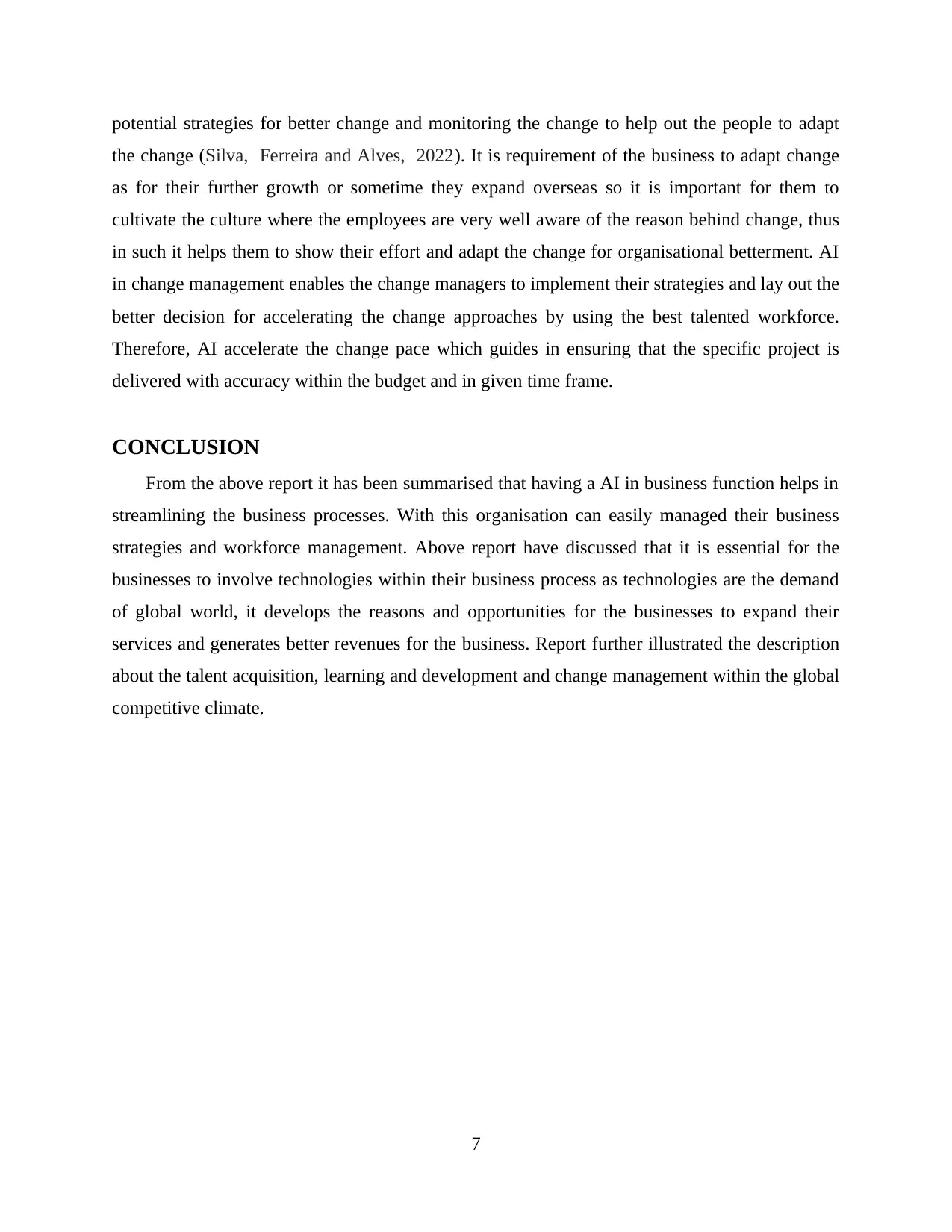
potential strategies for better change and monitoring the change to help out the people to adapt
the change (Silva, Ferreira and Alves, 2022). It is requirement of the business to adapt change
as for their further growth or sometime they expand overseas so it is important for them to
cultivate the culture where the employees are very well aware of the reason behind change, thus
in such it helps them to show their effort and adapt the change for organisational betterment. AI
in change management enables the change managers to implement their strategies and lay out the
better decision for accelerating the change approaches by using the best talented workforce.
Therefore, AI accelerate the change pace which guides in ensuring that the specific project is
delivered with accuracy within the budget and in given time frame.
CONCLUSION
From the above report it has been summarised that having a AI in business function helps in
streamlining the business processes. With this organisation can easily managed their business
strategies and workforce management. Above report have discussed that it is essential for the
businesses to involve technologies within their business process as technologies are the demand
of global world, it develops the reasons and opportunities for the businesses to expand their
services and generates better revenues for the business. Report further illustrated the description
about the talent acquisition, learning and development and change management within the global
competitive climate.
7
the change (Silva, Ferreira and Alves, 2022). It is requirement of the business to adapt change
as for their further growth or sometime they expand overseas so it is important for them to
cultivate the culture where the employees are very well aware of the reason behind change, thus
in such it helps them to show their effort and adapt the change for organisational betterment. AI
in change management enables the change managers to implement their strategies and lay out the
better decision for accelerating the change approaches by using the best talented workforce.
Therefore, AI accelerate the change pace which guides in ensuring that the specific project is
delivered with accuracy within the budget and in given time frame.
CONCLUSION
From the above report it has been summarised that having a AI in business function helps in
streamlining the business processes. With this organisation can easily managed their business
strategies and workforce management. Above report have discussed that it is essential for the
businesses to involve technologies within their business process as technologies are the demand
of global world, it develops the reasons and opportunities for the businesses to expand their
services and generates better revenues for the business. Report further illustrated the description
about the talent acquisition, learning and development and change management within the global
competitive climate.
7
Paraphrase This Document
Need a fresh take? Get an instant paraphrase of this document with our AI Paraphraser
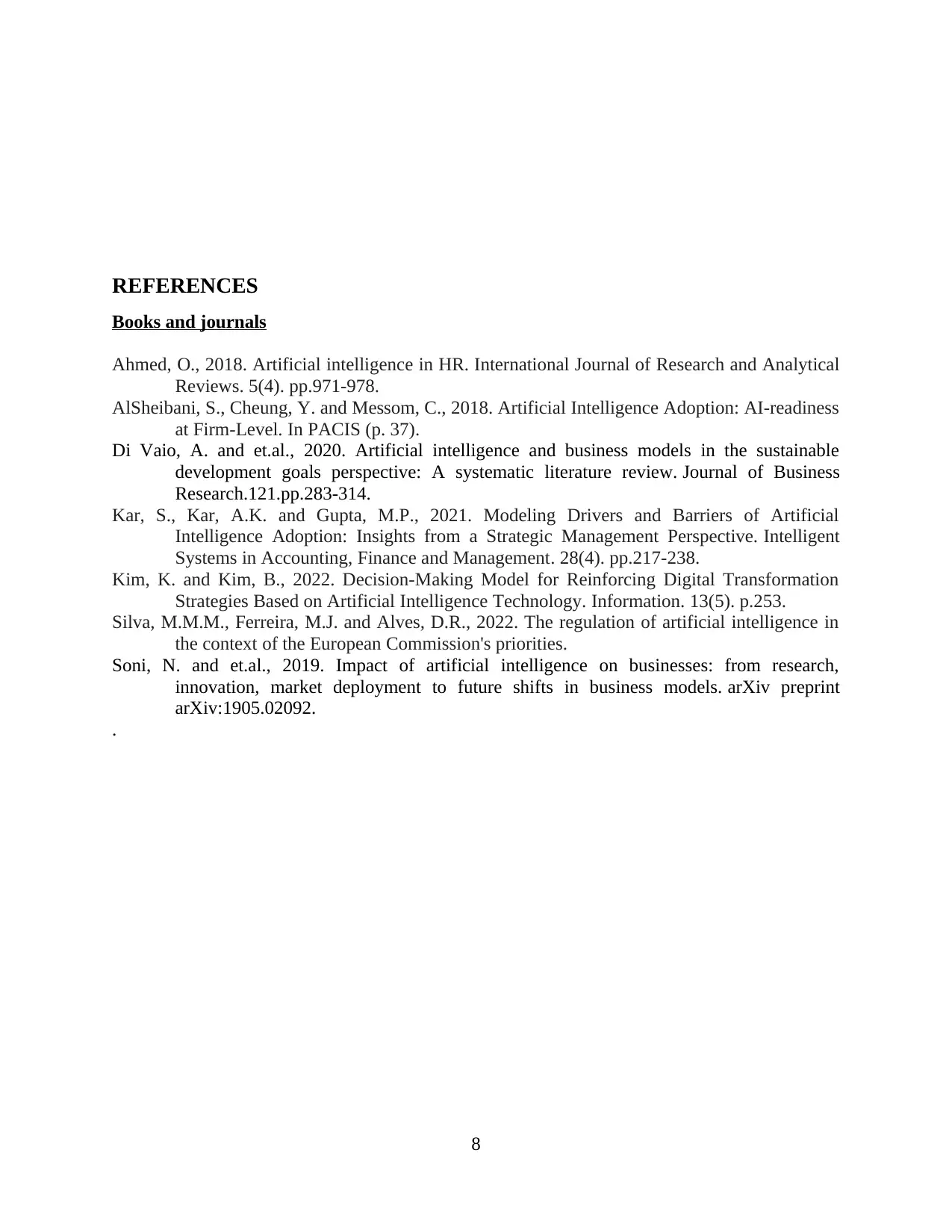
REFERENCES
Books and journals
Ahmed, O., 2018. Artificial intelligence in HR. International Journal of Research and Analytical
Reviews. 5(4). pp.971-978.
AlSheibani, S., Cheung, Y. and Messom, C., 2018. Artificial Intelligence Adoption: AI-readiness
at Firm-Level. In PACIS (p. 37).
Di Vaio, A. and et.al., 2020. Artificial intelligence and business models in the sustainable
development goals perspective: A systematic literature review. Journal of Business
Research.121.pp.283-314.
Kar, S., Kar, A.K. and Gupta, M.P., 2021. Modeling Drivers and Barriers of Artificial
Intelligence Adoption: Insights from a Strategic Management Perspective. Intelligent
Systems in Accounting, Finance and Management. 28(4). pp.217-238.
Kim, K. and Kim, B., 2022. Decision-Making Model for Reinforcing Digital Transformation
Strategies Based on Artificial Intelligence Technology. Information. 13(5). p.253.
Silva, M.M.M., Ferreira, M.J. and Alves, D.R., 2022. The regulation of artificial intelligence in
the context of the European Commission's priorities.
Soni, N. and et.al., 2019. Impact of artificial intelligence on businesses: from research,
innovation, market deployment to future shifts in business models. arXiv preprint
arXiv:1905.02092.
.
8
Books and journals
Ahmed, O., 2018. Artificial intelligence in HR. International Journal of Research and Analytical
Reviews. 5(4). pp.971-978.
AlSheibani, S., Cheung, Y. and Messom, C., 2018. Artificial Intelligence Adoption: AI-readiness
at Firm-Level. In PACIS (p. 37).
Di Vaio, A. and et.al., 2020. Artificial intelligence and business models in the sustainable
development goals perspective: A systematic literature review. Journal of Business
Research.121.pp.283-314.
Kar, S., Kar, A.K. and Gupta, M.P., 2021. Modeling Drivers and Barriers of Artificial
Intelligence Adoption: Insights from a Strategic Management Perspective. Intelligent
Systems in Accounting, Finance and Management. 28(4). pp.217-238.
Kim, K. and Kim, B., 2022. Decision-Making Model for Reinforcing Digital Transformation
Strategies Based on Artificial Intelligence Technology. Information. 13(5). p.253.
Silva, M.M.M., Ferreira, M.J. and Alves, D.R., 2022. The regulation of artificial intelligence in
the context of the European Commission's priorities.
Soni, N. and et.al., 2019. Impact of artificial intelligence on businesses: from research,
innovation, market deployment to future shifts in business models. arXiv preprint
arXiv:1905.02092.
.
8
1 out of 8
Related Documents
Your All-in-One AI-Powered Toolkit for Academic Success.
+13062052269
info@desklib.com
Available 24*7 on WhatsApp / Email
![[object Object]](/_next/static/media/star-bottom.7253800d.svg)
Unlock your academic potential
Copyright © 2020–2026 A2Z Services. All Rights Reserved. Developed and managed by ZUCOL.


